
Anna Larsson
School of International and Public Affairs, MIA, Human Rights, dual-specializing in International Conflict Resolution and Gender & Public Policy
Anna will be working with Belun, a community-based conflict-prevention NGO in Dili, Timor-Leste, on their newly launched Women, Peace and Security (WPS) project. Based on UNSC resolution 1325, the project highlights the important relationship between gender and conflict, and aims to build capacity among gender advocates to integrate equality principles into conflict prevention and peacebuilding. Anna will support the implementation of the project including monitoring and evaluation, and reporting on its gender advocacy component. In the future, she hopes to continue working with gender-responsive peacebuilding.
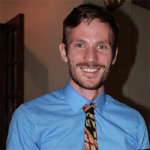
Ben Steiner
Teachers College, MA, International Education Development
Ben will be implementing teacher trainings for Human Rights instructors in Rahkine State, Myanmar, where protracted conflict between Rahkine Buddhists and Rohingya Muslims have led to expulsion of the Rohingya population and genocide. The training prepares teachers to implement a Human Rights curriculum Ben has developed in cooperation with the Peace and Development Initiative (PDI) in Sittway, Myanmar, and will be implemented in PDI’s various outreach programs throughout Rahkine State.
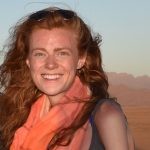
Claire Goelst
Ecology, Evolution and Environmental Biology Department, MA, Conservation Biology
Claire Goelst’s research is focused on understanding ecological and spatial drivers affecting human-wildlife conflict with lions around Etosha National Park, Namibia. The project uses data from 20 GPS satellite collared lions and historical accounts of lion mortalities to predict “risky” areas for future conflict events. The resultant conflict risk map will inform conservation planning and conflict mitigation strategies based on Etosha’s unique political, social and ecological landscape.
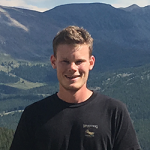
Daniel Thomas
Graduate School of Arts and Sciences, Ph.D. Candidate in Political Science and Government
Daniel’s research focuses on how violence shapes grievances and capacity for collective action. As an AC4 fellow, he will engage in fieldwork in Kachin State, Myanmar to investigate how state violence has affected the beliefs and behavior of the Kachin People. Specifically, he will implement surveys in IDP camps where citizens have been subject to violence and harrassment. The fieldwork will inform the design of further observational work and field experiments.
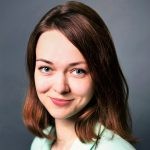
Irina Soboleva
Graduate School of Arts and Sciences, Ph.D. Candidate in Comparative Politics and Cognitive Psychology
Ira Soboleva studies civil engagement under illiberal policies and economic hardship. Her doctoral research critically examines the conditions under which political and economic threats do not lead to civil withdrawal from local politics. In her AC4 project, she combines innovative cognitive therapy with experimental fieldwork to test competing mechanisms behind local democratic consolidation. As an AC4 fellow, she will be cooperating with civil activists in Ukraine to identify the most cost-effective ways to empower local population and to provide citizens with practical tools of political influence.
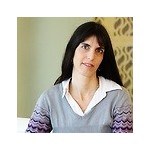
Keren Kuperman Nahum
School of Professional Studies, M.S. in Sustainability Management
Keren’s project aims to deal with the problem of dry waste within the East Jerusalem area, working with the organization “Community – Connecting Environment and People.” This area currently receives limited sanitation services from the Jerusalem municipality and suffers from neglect, which is causing severe sanitation hazards. The basis for this project is the need of Israeli recycling companies for additional raw materials that will be economically viable for both companies and residents. She will examine similar projects around the world, other potential alternatives and explore the needs and interests of the local residents, in order to develop a project that provides not only waste solutions, but also guidelines for local engagement. Keren’s life goals and aspirations are to be able to leverage her legal experience and close acquaintance with the business world to promote social goals that integrate between environmental sustainability and community engagement.
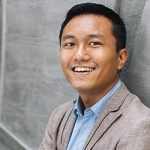
Niwa R. Dwitama
School of International and Public Affairs, MIA, International Security Policy
Niwa will be working with a Reality Check Approach (RCA) researcher to conduct an immersion study on “Islamic Boarding Schools (Pesantren) Students` Perspective on the Culture of Peace, Tolerance and Violent Extremism“ in two Pesantren that is part of deradicalization programs in Indonesia. The study specifically explores experience and provides a deeper understanding of the Culture of Peace, Tolerance and Violent Extremism through the interpretive lens of the students. By using RCA approach, this exploratory study will involve researcher staying in people`s homes for several days and nights, chatting informally, joining their everyday lives, and interacting with their neighbors.
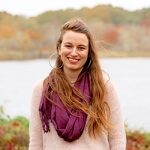
Rachel Kirk
Teachers College, MA, International Education Development
Rachel believes that global education should be accessible to all students. With this conviction, she started a non-profit called the Women’s Global Empowerment Initiative (WGEI) that works with young women of color from low-income high schools in Atlanta, Louisville, and New Orleans. Through this program, eight students will spend three weeks studying in Agadir, Morocco in partnership with the NGO Dar Si Hmad. Specifically, students will learn about the global intersections of issues of race, gender and environmental justice through lectures, excursions, and interactive student panels. Rachel will combine surveying and ethnographic methods to do evaluation research on this program, as well as to track longitudinal student outcomes on confidence, conflict resolution, and global citizenship. She plans to use this research in order scale up WGEI for more young women and develop other similar student programs.
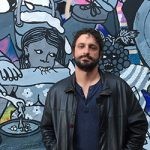
Luis Rodrigo Mayorga Camus
Teachers College, Ph.D. Candidate, Anthropology and Education
Rodrigo’s research explores how high school students have become relevant actors in the Chilean political scene during the the last decade, demanding the eradication of the neoliberal pillars sustaining the educational system since the 1980s, more inclusive schools and non-sexist education. It also examines how this context of student protests has affected the traditional citizenship education provided by the State, and produced several new informal citizenship education practices, both inside and outside the space of the school. This project hopes to understand the ways in which citizenship education within and outside the school comes together in an assemblage that informs the experience of being a student and a citizen in contexts of social violence, protest and turmoil, like that of contemporary Chile, and how, in the process of engaging with this assemblage of practices, students can strive for social change. It also expects to illuminate how educators and researchers can recognize the different citizenship education practices students engage with in order to build a more peaceful and democratic society and, more important, how they can engage productively with these youths as transformative social actors.
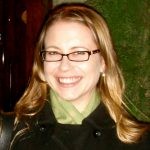
Summer Lindsey
Graduate School of Arts and Sciences, Ph.D. Candidate in Political Science
Summer’s research addresses questions about armed conflict and its effects on human security, with a particular focus on violence against women. As an AC4 fellow, Summer will travel to South Kivu, Democratic Republic of Congo to gain a better understanding of how local exposure to armed conflict affects social punishments for crimes against women. She will spend extended periods in two villages learning about local power structures and about how perpetrators of rape and domestic violence are treated. This qualitative work will complement her existing quantitative assessments of armed conflict’s effects.
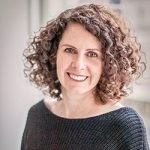
Tara Heidger
Dual Degree Student – Graduate School of Architecture, Planning and Preservation, M.S. in Urban Planning; School of International and Public Affairs, MIA
Tara’s research focuses on the Rwandan government’s efforts to resettle its rural farming population into grouped settlements following the 1994 genocide. It also will examine how resources and infrastructure were, and still are, distributed across much of its impoverished population. Basic principles of sustainable peace will be examined to determine a presence of any ethnic fracturing among villages and villagers as well as the perceived inclusion in sustainable socio-economic development decisions throughout the resettlement process. By way of historical research, interviews and observations, this project aims to determine the level of ownership and participation resettled persons feel as they move(d) into new communities. With mass migrations of people occurring around the globe, understanding effective resettlement policies is important in both reconciliation and long-term peace.
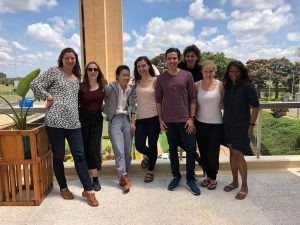
Margaret Sagan, Stephanie Regalia, Chisato Sakamoto, Sabrina Kuri, Daniel Ramirez, Bianca Flamengo, Katharina Beck and Anita Dorett
The 2017-2018 Business and Human Rights Clinic is studying large-scale land investments in Malawi. As part of this research, the team is helping NGO Landesa refine its Malawi investor guidebook for the Responsible Investment in Property and Land project. Drawing from their wide array of expertise, the clinic members are incorporating a human rights perspective to Landesa’s material. In addition to this project, the team is conducting further research into the impact of Malawi’s new land laws and the changing agricultural investment climate. While commercial investors are hopeful that the reforms will provide a secure framework for land registration and transactions, the viability of these laws is highly contested. The team is focused on understanding environmental and social risks in Malawi and developing investor tools that minimize these disruptions to protect human rights.
